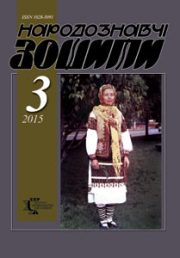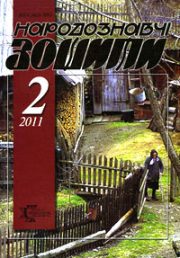The Ethnology Notebooks. 2017, 3 (135), 503–530
UDK 94:[001.32:39](477)С.Павлюк
https://doi.org/10.15407/nz2017.03.503
A QUARTER CENTURY STRUGGLE FOR OUR FUTURE!
Pavliuk Stepan Petrovych, Doctor of Sciences in History, Professor,
Academician of NAS of Ukraine,
Director of the Institute of Ethnology
of the National Academy of Sciences of Ukraine.
Svobody Avenue 17, 79000, Lviv, Ukraine.
Contacts: Tel.(032) 297-01-57; e-mail: ina@mail.lviv.ua
Abstract. Stages of formation of the Institute of Ethnology of NAS of Ukraine and Museum of Ethnology and Crafts (attached to the Institute) are highlighted. Names of Galicias` science creators, beginning with members of “Ruska triitsa”, names of directors of scientific institutions, which became a foundation for today’s Institute, are honoured. Activity of scientists of the institution and their contribution both in Ukrainian and global science are highlighted. It is accentuated, in particular, on the Institutes` achievements in the field of investigation after Chernobyl nuclear catastrophe of Polissias` zone at the territory of nowadays 1 – 3 zone of radioactive contamination. The Institutes` investigations in the field of urban ethnology in the branch of ethnical politics, language development, decolonization of urban cultural and civilization sphere, orientation into theoretical comprehension of modern social and cultural dynamics transformations, especially interethnic communication, globali¬zation, labour migration problems etc are demonstrated in the article. The Institute publishing activity is outlined.
Keywords: Institute of Ethnology of NAS of Ukraine, Museum of Ethnology and Crafts, scientists, researchers, professor Y. Hoshko, academician S. Pavliuk, publishing activity.
Received 22.02.2017
REFERENCES
Arkhiv IN NAN Ukrainy. Op. 1 Khudozhn’oi promyslovosti. Od. zb. 4 [in Ukrainian].
Dnistrians’kyj, M. (1992). Kordony Ukrainy. L’viv. S. 107 [in Ukrainian].
Zastavnyj, F. (1993). Ukrains’ki etnichni zemli. L’viv. S. 48 [in Ukrainian].
Franko, I. (1956) Tvory: u 20-ty t. T. XIX. Kyiv [in Ukrainian].





